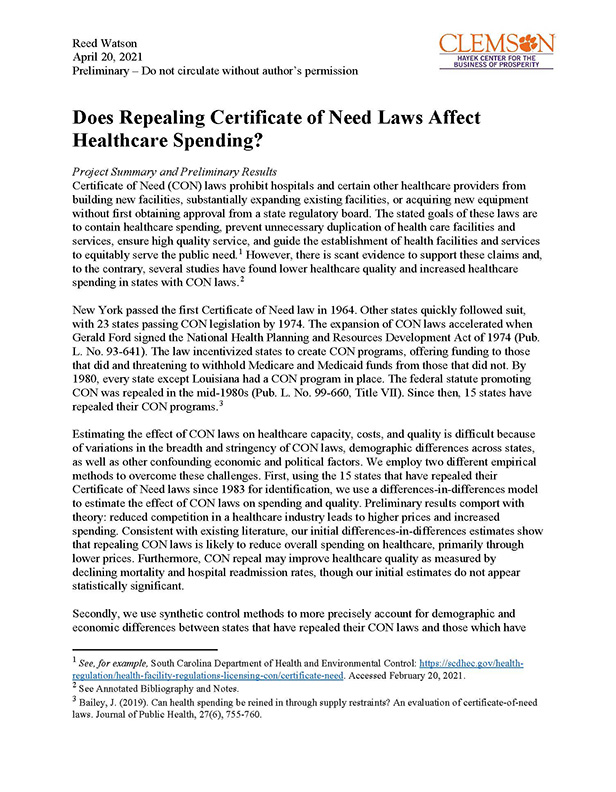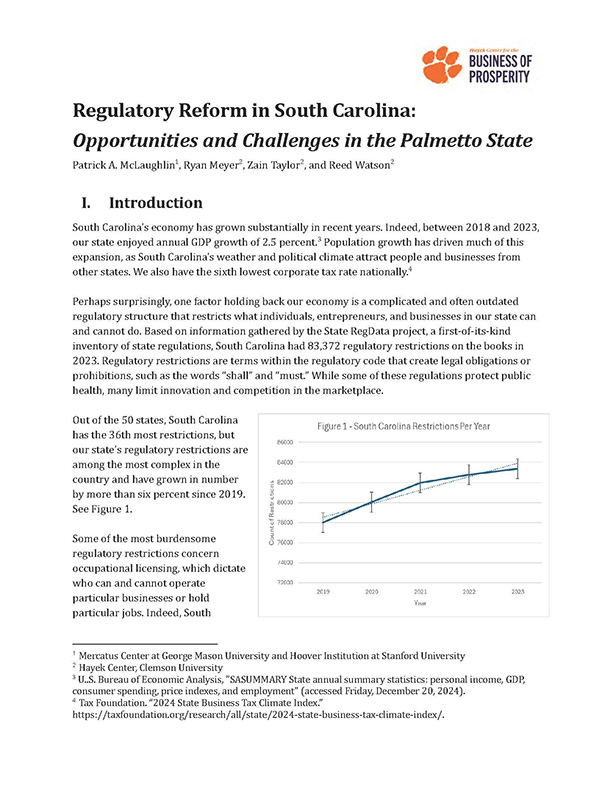Does repealing certificate of need laws affect healthcare spending?

Research
The Hayek Center supports multiple research initiatives that examine when and under what conditions business activities shape the human condition. We are interested in how economic and legal institutions affect markets and, consequently, how markets affect individual and firm behaviors. Our research is guided by a genuine interest in relevant social problems and grounded in academic integrity.
Topics of interest include, but are not limited to:
- Law and economics, particularly antitrust and intellectual property.
- Regulation and its effect on economic growth, innovation, and health.
- Disruptive technologies and their long-run impact on consumers and workers.
- Market access and development in poor communities.
Policy Briefs and Congressional Testimony
Conferences
- Hayek Center hosts the 2024 ESG and Policy Research Conference - The Hayek Center for the Business of Prosperity hosted the 2024 ESG and Policy Research Conference from March 29-30, 2024. Read more.
- Hayek Center hosted the 2023 Labor Markets & Public Policy Conference - The Hayek Center held a workshop at Clemson University, Feb. 24-25, for the top up-and-coming economists nationwide to gather and discuss their research and its practical public policy implications. Read more.
- Hayek Center hosted the 2022 ESG and Policy Research Conference - The Hayek Center for the Business of Prosperity hosted the 2022 ESG and Policy Research Conference on Sept. 2-3, 2022. Find out more.
- Hayek Center Civil Discourse Project sharpens students' persuasive powers - The Hayek Center for the Business of Prosperity is happy to announce the return of the Civil Discourse Project, which aims to help students navigate disagreements on various controversial topics regarding business.
- Hayek's Excellence in Research and Outreach - The Hayek Center awarded a $5,000 top prize and a $2,000 second-place prize to the winners of the 2nd annual HERO Prize program, benefiting student research groups doing humanitarian work. Read more.
- Hayek Center Director Reed Watson Weighs in on Business Roundtable Statement - Reed Watson published a letter to the editor of The New York Times. Read the article.
Center Funded Research Projects
"Certificate of Need"
Investigators: Vitor Melo and Reed Watson
Summary: Certificate of Need (CON) laws prohibit hospitals and certain other healthcare providers from building new facilities, expanding existing facilities or acquiring new equipment without first obtaining approval from a state regulatory board. The stated goals of these laws are to contain healthcare spending, prevent unnecessary duplication of facilities and services, and ensure high-quality service, yet evidence of their effectiveness is scant. Using a differences-in-differences model, we find CON laws reduce competition in the healthcare industry, leading to higher prices and increased spending. To more precisely account for demographic and economic differences between states that have repealed their CON laws and those that have not, we also construct a weighted combination of control states against which the treatment group is compared. As with the differences-in-differences model, we use as the treatment group those states that originally enacted and then subsequently repealed their certificate of need law. Initial findings using synthetic controls suggest the differences-in-differences models may underestimate cost savings from repealing CON laws.
"Guaranteed Basic Income Pilot"
Investigators: Jorge Garcia, Patrick Warren, Reed Watson
Summary: Guaranteed Basic Income (GBI) is a policy that guarantees a cash grant to households or individuals, usually every month. The policy received attention recently as the primary policy proposal of presidential primary candidate Andrew Yang, but had earlier support from both Dr. Martin Luther King Jr. and Milton Friedman. GBI has the potential to release individuals from a poverty trap – where the day-to-day struggle to meet immediate needs means a single slip can lead to job loss, eviction, bankruptcy, or reduced physical and mental health. In this environment, the long-term investments in skills and competency required to escape poverty are extremely risky and unlikely to occur. GBI can make those investments more likely. However, the overall impact of such a policy is not unambiguously positive. The main concern is that guaranteeing a basic monthly income could lower employment and labor force participation.
Until this project, all the academic and policy work directly evaluating GBI in the developed world has focused on urban settings. In these settings, GBI is shown to reduce the variability of consumption, improve mental and physical health, and increase career-related investment (internships, classes, and job hunting). There is no evidence of a dis-employment effect. On the contrary, there is some evidence that, after a year of GBI, recipients are more likely to be employed than non-recipients (Marinescu, 2018; SEED, 2021). Poverty is an issue in rural areas, and the tradeoffs might substantially differ in that setting. To study these tradeoffs, we aim to implement a social experiment for producing state-of-the-art evidence on the socioeconomic implications of GBI in rural areas and small towns near Clemson, South Carolina.
"Management Flexibility and School Performance"
Principal Investigator: Patrick Warren
Summary: In studying education, the flexibility of managers (principals) to change management practices might be constrained for public schools, while private and charter schools have greater flexibility to adopt new practices. Additionally, private and charter schools are subject to market forces while the state insulates public schools. Flexibility and market forces might be complements in the production of student outcomes, or they might be substitutes, understanding which matters for student outcomes. An improved understanding of this could not only help in the understanding of management practices in education and student performance but also improve the understanding of the role constraints (or lack of constraints) placed on managers that impact the adoption of successful management practices and, ultimately, firm outcomes. Using student performance on the state test as our measure of organizational performance, we are looking at how management matters for student performance and if it matters differentially for public or private schools.
"Generic Antibiotics, Prescriptions of Antibiotics, and Effectiveness of Antibiotics"
Principal Investigator: Scott Templeton
Summary: Major news media regularly report the growing ineffectiveness of antibiotics and antiviral medicines and worldwide concerns about untreatable or difficult-to-treat infections. This study examines the role of competition in the pharmaceutical industry, in particular, how the expiration of patents for brand-name antibiotics affects the development and prescription of generic antibiotics.
"Market Access in Impoverished Regions"
Principal Investigator: Reed Watson
This study will develop policy reforms and training to address region-specific infrastructural, informational, economic, and legal constraints on market development. Specifically, we will examine supply chains, market structures, land tenure, and finance in impoverished areas to complement and maximize the effectiveness of ongoing agricultural education and innovation.
Graduate Students
The Hayek Center supports graduate students and post-doctorates whose research explores the role of competition in the marketplace and who are interested in pursuing careers in academia. If you are a graduate student or postdoctoral researcher interested in conducting research at the Hayek Center, please contact us.

